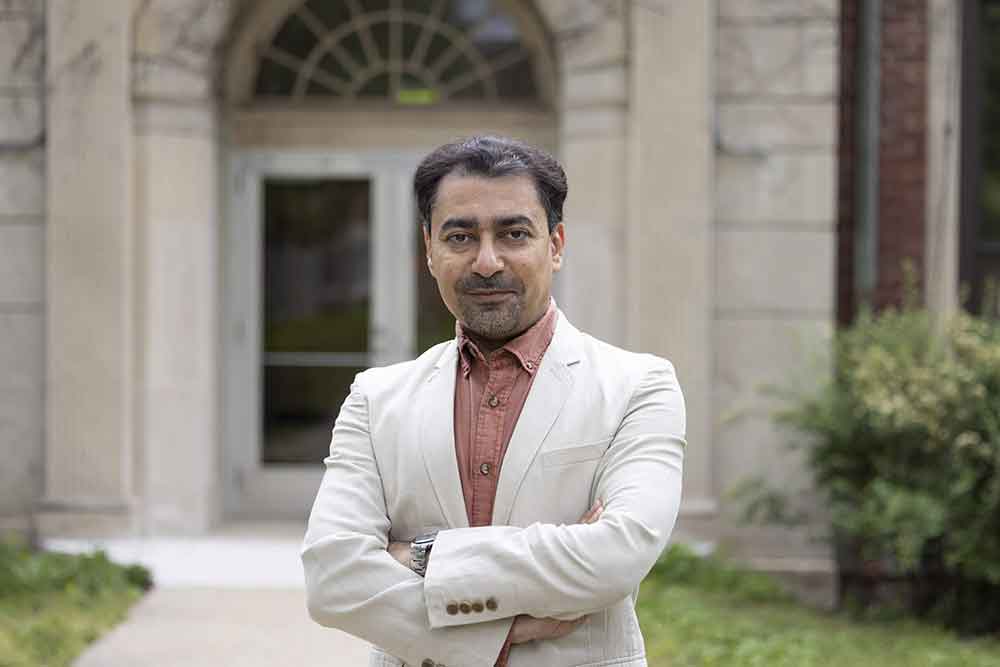USDA Awards NIU $650K For Biomass Pipeline Feasibility Study
Northern Illinois University (NIU) professor Mahdi Vaezi is investigating the feasibility of constructing an innovative, first-of-its-kind biomass pipeline. The research project, supported by a $650,000 award over four years to NIU from the U.S. Department of Agriculture, could lay the groundwork for the world’s first biomass pipeline in the state of Maine, says Vaezi, a professor of Engineering Technology.
“Much of the world is dependent on fossil fuels, and everyone is looking for replacement options,” Vaezi explains. “Yet we have vast sources of biomass that are wasted or underutilized.”
Vaezi first studied the feasibility of a biomass pipeline for his dissertation nearly a decade ago at the University of Alberta in Canada. For the new project, he’ll have considerably more resources at his disposal.
The USDA grant will be used in part to purchase roughly $100,000 in instruments and equipment for a new Waste Advanced Solution Technologies and Ecosystems Laboratory (WASTE Lab), where a 30-ft., closed circuit prototype pipeline will be assembled in coming months. NIU’s Department of Engineering Technology, College of Engineering and Engineering Technology and Division of Research and Innovation Partnerships (RIPS) are supporting the laboratory development as well.
RIPS also helped Vaezi find industry and scientific partners for the project. Collaborators on the grant are Dr. Parisa Mirbod (the Mirbod Lab) at the University of Illinois at Chicago (UIC) and Biofine Developments Northeast Inc., a biomass user and biorefinery. Mirbod and her group at UIC will investigate the phenomena behind plug flow formation and drag reduction effect in the flow of fibrous biomass particles slurries in pipes and pumps using flow visualization techniques such as particle image velocimetry (PIV).
“This is a great example of a research collaboration that connects a faculty expert with innovators, entrepreneurs, industry and students,” says Gerald Blazey, vice president of RIPS. “We’re happy to help support this important research.”

Engineering Technology Professor Mahdi Vaezi
In consultation with the Construction Management Institute of Maine, the project will include a case study of the techno-economy of large-scale and long-distance biomass pipelines, for a potential 10-mi. long woodchips pipeline to supply a commercial port in Eastport, Me. The woodchips would be pipelined in a slurry (a mixture with water) to the port and shipped to Europe.
The high cost of transporting biomass feedstock, most often by truck, has been a major barrier toward increasing the scale of biomass-based energy facilities. The current study will include technological and economic analyses to compare the pipeline hydro-transport of biomass with truck, train and ship transportation in short, medium and long distances.
An added benefit of a pipeline system is that the biomass slurry can be heated to destroy contaminants or infestation that may be subject of biomass shipping regulations, Vaezi adds. Once delivered, biomass could be screened to recycle water and moved to an open space, where it could be naturally or mechanically air dried at little to no cost.
In addition to wood chips, the NIU team will study the economic and mechanical feasibility of pumping sawdust and wheat straw water mixtures via pipeline.
“Biomass feedstock provides energy security,” Vaezi says. “It’s the only type of renewable energy that can be directly converted into biofuel. We anticipate this novel work will introduce pipeline as a technically feasible and economically viable mode of delivery to transport biomass feedstock in large scales and over long distances at costs noticeably lower than other modes of delivery, such as truck, train and ship. This will make biomass-based energy facilities scale- and economy-wise competitive with fossil fuel-based plants.”
Latest news
Humboldt Sawmill Gains Biochar Certificate
Utilizing major cogeneration residual, Humboldt Sawmill in Scotia, Calif. has obtained a European Biochar Certificate, the first U.S. based company to do so…
Pinnacle Renewable Energy To Be Acquired By Drax Group
Pinnacle Renewable Energy Inc. has entered into an arrangement agreement with Drax Group and its wholly-owned subsidiary, Drax Canadian Holdings Inc., pursuant to which Drax will acquire all of the issued…
Enviva Considers Biomass Role In Hydrogen Economy
With the start of 2021 comes a new U.S. administration and the U.K.’s official departure from the EU, while the implementation of the EU Green Deal and the aftermath of the COVID-19 pandemic carries over from 2020….
Mainstream Pine Products Building Crude Tall Oil Biorefinery
Mainstream Pine Products, LLC, founded by a group of investors dedicated to using specialty chemicals from pine trees in a variety of downstream products for complex industries, has announced plans for an…
Hybrid Solar-Biomass Plant Is Running
Two 20.5 MW heaters manufactured by Sugimat for Termosolar Borges, the world’s first solar thermal-biomass hybrid plant, are operating at full capacity after successful performance tests. The plant, unique in the world due to its…
Find Us On Social
Subscribe to Our Newsletter
Wood Bioenergy News Online hits the inboxes of subscribers in the wood-to-energy sectors.
Subscribe/Renew
Wood Bioenergy is published and delivered worldwide 6 times per year. Free to qualified readers in the U.S. Subscribers outside the U.S. are asked to pay a small fee.
Advertise
Complete the online form so we can direct you to the appropriate Sales Representative.
